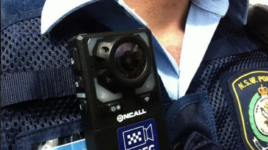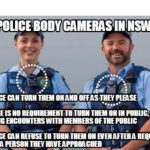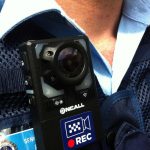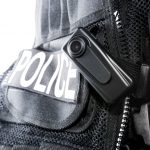How Do I Request Body-Worn Video Footage from NSW Police?

The Law Enforcement Conduct Commission (LECC) made it known in September that despite being the sole state police watchdog charged with investigating NSW Police Force misconduct, it’s been waiting close to a month on average to access body-worn video following critical incidents.
Twenty seven days is the timeframe that it has been taking the state law enforcement body to hand over footage that’s vital to LECC inquiries into incidents that are warranted under its mandate.
Commencing operations on 1 July 2017, the LECC was established with the aim of consolidating and streamlining police oversight in this state.
These revelations arose as questions were being asked about the use of force by NSW police when they’re sent out to deal with individuals who are suffering mental health episodes, as four such incidents have ended with a fatal shooting or tasering since May.
A LECC spokesperson outlined that whilst the watchdog regularly uses such footage it does not have direct access to the NSW Police Force database, which is adding weeks to investigations.
However, due to these circumstances, they added, that a new arrangement between the agencies had been struck.
But it’s not just those charged with investigating the police that have a right to access body-worn video (BWV) footage, as all civilians who come under the scrutiny of a police officer and are then recorded by such devices, have the right to view such footage.
What is the process of requesting to see BWV?
NSW police began trialling the use of body-worn video cameras in 2013, and the following year saw the state law enforcement agency commence rolling the devices out to local area commands, which was a coordinated process taking place over two phases.
If you are caught up in an incident where police have been recording, you can request a copy of the footage, via the provisions set out in the Government Information (Public Access) Act 2009 (NSW), which is commonly referred to as the GIPA.
The GIPA encourages “the proactive public release of government information by agencies”, which, under section 4, includes a public authority, while schedule 4 of the legislation assures that the NSW Police Force is a public authority.
And such agencies can only deny the ability to view this open access information if there is an overriding public interest reason to do so.
The NSW Police Force provides a Community Portal to request such information online, as well as an Information Access Application Form that can be printed out and sent to: NSW Police Force, InfoLink Unit, Locked Bag 5102, PARRAMATTA NSW 2124. A person can also lodge the application at Police Headquarters, 1 Charles Street Parramatta NSW. A $30 fee is also required to process the request, which can be paid online or posted in via money order or cheque.
Once such a request is approved, you will be able to attend the related police station in order to view the footage, as NSW police does not usually provide a copy of BWV, as it aims to protect its officers and any witnesses involved.
If the footage is related to a criminal prosecution, it should also form part of the brief of evidence.
When do police use body-worn video cameras?
“Activation of BWV cameras is required when circumstances to commence recording are anticipated, evolving, or actually occurring,” outlines NSW police commissioner Karen Webb in the latest version of the NSW Police Force Body-Worn Video Standard Operating Procedures.
“In addition to ensuring early activation, a BWV recording should only be deactivated when all relevant material, including interactions and evidence, has been captured and the incident has concluded.”
The use of body-worn video is regulated in NSW, under section 50A of the Surveillance Devices Act 2007 (NSW). It sets out that BWV can be used in the line of duty. Its use must be overt, which becomes the case when the officer informs the person that they are being recorded.
BWV recordings must be safely stored, managed, and processed according to current legislation and procedures, such as the State Records Act 1988, Privacy and Personal Information Protection Act 1988, and Government Information (Public Access) Act 2009.
And if a private conversation is the subject of recording, the officer must be in uniform or have provided evidence that they are an officer to all parties involved.
“The use of body-worn video by a police officer is also in accordance with this section if it is inadvertent or unexpected, or it is incidental to the use of body-worn video by the police officer in the circumstances set out” earlier in the section, the legislation reads.
The SOPs stipulate that “members of the public will be advised they are being recorded if it is practicable to do so before or at the time of activating the recording, or as soon as is reasonably practicable”. BWV can be shot in public settings, in private or on business premises.
BWV footage is treated as protected information, which means it can only be used as is stipulated in the Surveillance Devices Act or any relevant regulations. Misuse of BWV footage leads to those found guilty of this offence being liable to up to 7 years imprisonment.
And in circumstances where an officer failed to switch on their device in the field at an appropriate time, the individual in question may be asked to explain their decision to a supervisor or in court.
What principles guide police use of BWV?
The manual sets out five guiding principles for NSW police officers using BWV:
- BWV camera equipment will be used by the NSWPF officers in the lawful execution of their duties,
- BWV will be used by police to record events, incidents, and evidence,
- BWV supports conventional forms of evidence gathering, but does not replace them,
- BWV recordings will be securely processed and managed in accordance with relevant legislation, policy, and procedures, and
- The NSWPF will provide general information to the community on the use of BWV by police.
These stipulate that police must use discretion in deciding whether BWV use is overt and that BWV use can be inappropriate at times. Their use mustn’t replace traditional evidence gathering. The recordings must be securely processed, and officers must provide general information about use. The NSWPF also provides further informational and multimedia material accessible by contacting the Operational Legal Advice Unit.
Updates: AI-Backed Technology
Police departments worldwide are now including body-worn cameras in order to hold officers accountable and boost public trust. However, the increase in the number of cameras has led to an astronomical amount of data that is never even viewed.
Thus, some police forces are considering using artificial intelligence tools to analyse BWV. Australian police are now using AI-backed software to review body camera footage to help prevent unnecessary incidents and charge the appropriate people, as is in the case of Officer White who tasered a 95-year-old woman who later died.
But, the inclusion of AI in reviewing and monitoring data could cause more issues than good. A similar idea occurred in 2000 when the New South Wales Police force decided to launch predictive technology that would identify who would commit crimes before they even happened — a terrible idea that ended up disproportionately targeting indigenous youth.
Overall, including AI technologies might not target the actual root cause of the issue — especially if it takes the place of policy and procedural reforms, organisational fixes, and police training.
If you have been filmed by police and are going to court in relation to the matter, call Sydney Criminal Lawyers on 9261 8881 to arrange a free first conference with one of our experienced defence lawyers, who will assess the case, advise on your options and fight for the optimal outcome.





